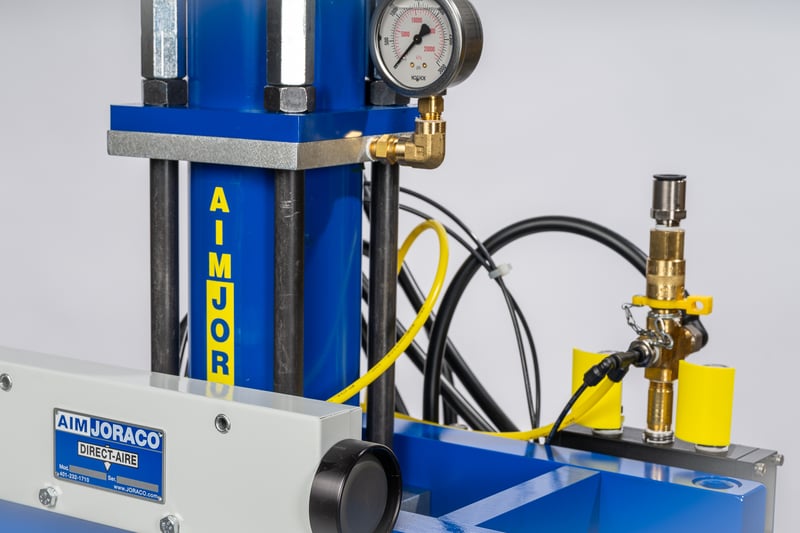How Does a Pneumatic Press Work?
From dental equipment to roofing guns to tractor brakes, you will find pneumatic systems in a wide range of applications. In manufacturing, machining, and other industrial applications, pneumatic presses offer a range of benefits, including power, speed, cleanliness, and low maintenance. These presses generate a force greater than manpower alone can supply. It can be used for pressing, squeezing, forming, fand other actions in myriad industrial settings.
How Does a Pneumatic Press Work?
The potential force of a pneumatic press comes from compressed air or gas. An electrical charge or control valve sets the machinery into motion, feeding compressed air or gas into cylinders or tubes connected to the actual press mechanism. When the gas fills the tubes, the resulting pressure forces the movement – usually downward – of the press mechanism.

When this movement is complete, the gas then escapes through exhaust valves, and mechanical springs push the mechanism back into its original position. Direct acting pneumatic presses are the most widely used type in industrial applications.
Differences Between Hydraulic and Pneumatic Presses
There are several key differences between the pneumatic press and its counterparts, such as hydraulic or mechanical presses. These include:
Method of Operation
Hydraulic presses function on similar principles to pneumatic presses, but instead of compressed air, the driver for their movement is a fluid—usually a type of oil.
Maintenance
Pneumatic presses do not typically require much in terms of maintenance. If there is a leak, for example, then only air escapes, which can be easily replaced once the leak has been repaired. Conversely, if a hydraulic machine leaks, it loses fluids, creates a mess that requires time to clean up, causing increased expense for both the lost fluid and the downtime.
Capabilities
Pneumatic presses often operate at very high speeds, whereas hydraulic presses are much slower in their movements. Since pneumatic presses operate with air instead of liquid, they cannot achieve the same level of consistency in their application of force that a hydraulic press can. The optimal choice between a pneumatic press and a hydraulic press often comes down to the speed and pressure requirements of the intended application.
Pneumatic Press Safety Procedures
As with all industrial machinery, it is important to follow rigorous safety guidelines when working with a pneumatic press. Here are two important recommendations to ensure the safety of pneumatic press operators:
1. Properly release compressed air. The sudden, improper release of compressed air can cause serious injury or death. Therefore, it is vital that works know how to properly release the machine’s compressed air. Each press should have a relief valve – often called a dump valve – that allows the air to escape in a controlled fashion. The dump valve should be used before press inspections, during emergency situations, in another lockout/tagout scenarios, or when operations are completed—if the press is inactive, there should be no compressed air in it at all.
2. Restrain all equipment tubing. Tubes that contain compressed air may be hazardous if they break loose from their sockets or spring a sudden leak. Therefore, it is important to bundle them together with cords or bonds that will reduce the risk of a tube whipping out and harming a worker. For higher pressure applications, it may be necessary to encase the tubes in extra protective equipment.
How Pneumatic Presses Can Benefit You
Pneumatic presses can be used in many commercial and industrial applications, offering fast, clean, affordable, and low-maintenance power for machinery across myriad industries. At Joraco Press Company, we have been experts and innovators in the field of pneumatic presses since 1947. We provide comprehensive pneumatic press solutions to clients in manufacturing, assembly, and more.
If you think a pneumatic press solution could be the answer to a challenge in your operation, please
to discuss your options or request a quote.
Subscribe here to be alerted when we post new articles!
Are you ready to place an order?
Ordering a standard press from Joraco Press Company is easy! Send us a Quote Request and we will respond quickly with a detailed Estimate. Specify the press you need, the force your application requires, and specifications about your project so we can confirm your requirements. Just reference the Estimate in your Purchase Order!
